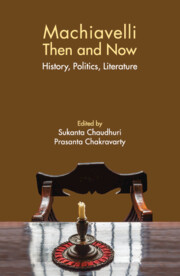6 - Machiavelli and the Solitary Discipline of Hunting
Published online by Cambridge University Press: 21 January 2022
Summary
From his well-known letter of 10 December 1513, written to Francesco Vettori, we have come to know about Machiavelli's snaring of thrushes with his own hands: rising well before dawn, he would prepare his snares and go off with a pile of cages on his back, looking like ‘Geta returning from the port with Amphityron's books’. We also know from the same source that once the migration of the thrushes came to an end by early December, Machiavelli, after talking to the woodcutters on his daily rounds, would often leave the woods to visit a stream and proceed thence to some bird traps. On such trips, he would take a book with him—Ovid, Tibullus, Dante, or Petrarch. Reading about their amorous passions and recalling his own, he would dwell pleasurably on those thoughts for a while.
As Italy marked the 500th anniversary of The Prince, there came to light a previously unknown poem, signed with the initials N. M.: an epigram in memory of the banker Lorenzo Strozzi's beloved dog, where the poet extols the virtues of hunting dogs. It is probably a commissioned work. The poem, just four lines long, extols the speed and strength of the dog, ‘born in Etruria’ and called Furia or Fury, suggesting it may have been a mastiff or hound. The verses describe how it could ‘beat the hare at running and the deer at jumping’. There are also the three ‘prison sonnets’ addressed to Giuliano de’ Medici. In one of those, Machiavelli encounters the creaturely world in much more trying circumstances: ‘These walls exude lice,/ sick with the heaves no less, that [are as big as] butterflies,/ nor was there ever such a stench in [the massacre of] Roncesvalles.’
Such biographical details depict Machiavelli's occasional encounters with the zoological world. However, he also highlights certain eternal confrontations that are, at the same time, ways of maintaining an order of life, involving a different kind of creaturely encounter. Such encounters pertain to questions of leadership and order by means of inculcating virtù. But the process of acquiring virtù is perhaps the most difficult topic to pinpoint in his oeuvre. One way of doing so might be to study the underlying motif of hunting in some of his works and parts of his own life.
- Type
- Chapter
- Information
- Machiavelli Then and NowHistory, Politics, Literature, pp. 96 - 120Publisher: Cambridge University PressPrint publication year: 2022



